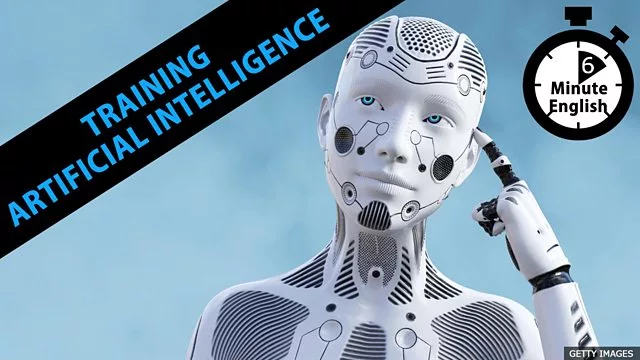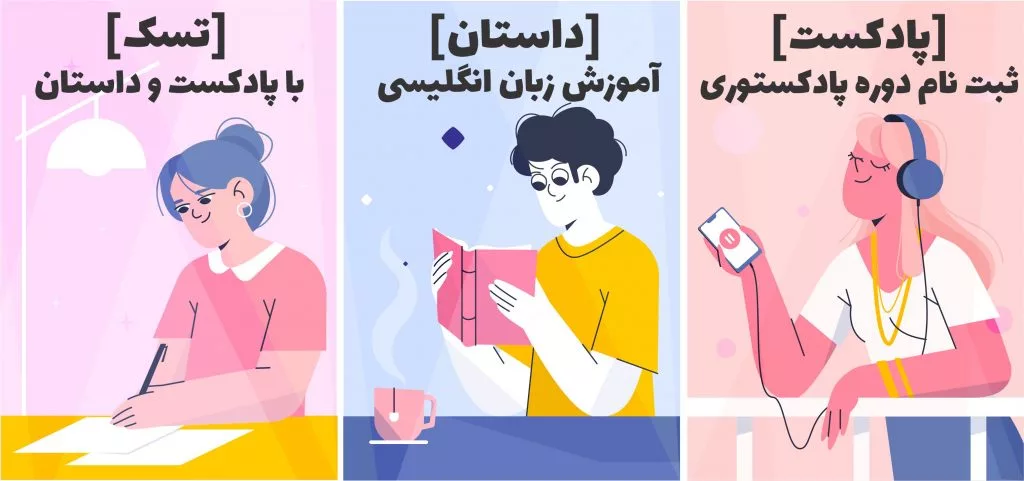پادکست انگلیسی BBC – آموزش هوش مصنوعی
به نظر شما هوش مصنوعی چقدر باهوشه؟ در حال حاظر در موارد زیادی به ما کمک میکنه، از سیستم مسیریابی خودرو گرفته تا تشخیص سلول های سرطانی. اما هنوز از آدم ها باهوش تر نشده. هنوز هم این آدم ها هستند که باید هوش مصنوعی رو آموزش بدن تا بتونه کاری رو انجام بده. اما آیا ممکنه در آینده بیش از حد آموزش ببینن و تهدیدآمیز بشن؟ (نظر خودتون رو به انگلیسی در بخش دیدگاه با ما در میون بذارید!) در پادکست انگلیسی BBC – آموزش هوش مصنوعی می شنویم که نیل و سم درباره ی این موضوع صحبت می کنن و در طول مسیر کلمات جدیدی هم آموزش میدن.
سوال پادکست انگلیسی BBC – آموزش هوش مصنوعی :
In terms of brain cell count, what level of intelligence is AI currently working at? Is AI as smart as:
a) a frog
b) an earthworm
c) a bumblebee
به پادکست خوب گوش کن تا جواب رو پیدا کنی.
اگر می خوای گوش دادن به پادکست تا حد امکان برات ساده و کارآمد باشه مراحل زیر را دنبال کن:
هر روز به پادکست گوش کن. وقتی براش یه وقت ثابت در روز در نظر بگیری برات تبدیل به عادت میشه و این عادت هرروز پیشرفت میکنه.
پادکستی رو پیدا کن که موضوعش برات جالب باشه. وقتی از خود موضوع لذت ببری یادگیری هم برات لذتبخش میشه.
به پادکستی گوش کن که transcript یا متن داره. این بهت کمک می کنه تا کلمات و عبارات جدید رو به سرعت در متن پیدا کنی و ساختار انواع مختلف جمله رو خوب یاد بگیری.
پس از گوش دادن به پادکست با متن، در مرحله بعدی سعی کن بدون نگاه کردن به متن این کار رو انجام بدی. این کار مهارت شنیداری رو تقویت می کنه و کمک می کنه تا انگلیسی زبانان بومی را راحت تر درک کنی، حتی اگر خیلی سریع صحبت کنن.
اگه به پادکست انگلیسی گوش کردی و نتونستی کامل متوجه اش بشی، ناامید نشو. پادکست هایESL -English as Second Language بیشماری وجود دارن که برای سطوح مختلف، از ابتدایی تا پیشرفته طراحی شدن. مطمئنا هر روز می تونین یه پادکست مناسب با سطح خودت پیدا کنی.
فراموش نکن که هرچی بیشتر تمرین کنی در اون مهارت رشد میکنی! به قول انگلیسی ها: Practice makes perfect
واژگان کلیدی پادکست انگلیسی BBC - آموزش هوش مصنوعی
| معنی به فارسی | معنی به انگلیسی | واژه |
| سر صحبت رمانتیک باز کردن | remarks men and women make to start up a romantic conversation with someone they don’t know but find attractive | chat-up lines |
| برنامه نویسان کامپیوتر | people who write, or code, computer programmes | computer programmers |
| الگوریتم | a set of rules or procedures to be followed by computers in problem-solving exercises | algorithms |
| آزمون و خطا | repeating the same task over and over until finding the most successful way | trial and error |
| به حداقل رساندن | reducing as much as possible | minimising |
| وقتی یک اتفاق غیرمنتظره از روی شانس یا اقبال اتفاق می افتد | when something unexpected happens by good luck or chance | a stroke of luck |
BBC 6 minute English -Training artificial intelligence

متن پادکست انگلیسی BBC - آموزش هوش مصنوعی
Neil
Hello. This is 6 Minute English from BBC Learning English. I’m Neil.
Sam
And I’m Sam.
Neil
Do you like cooking, Sam? There’s a new recipe I’ve been trying out - it’s for ‘frosted oysters’.
Sam
Frosted oysters?! Sounds… unusual. How do you make it?
Neil
Well, take a pound of chicken, then some cubed pork and half a crushed garlic.
Sam
Eh? I thought you said it was for ‘frosted oysters’, whatever they are.
Neil
Yes, that’s right. Now heat it up until boiling and serve with custard.
Sam
Ugh, that sounds disgusting! Who on earth told you that recipe?
Neil
It’s not ‘who’ told me, Sam, but ‘what’. In fact, that recipe was made by computers using artificial intelligence, or AI, which is the topic of today’s programme. In real life, AI is making huge progress - from car satnavs to detecting cancer cells. But as you can see from that revolting recipe, things don’t always go according to plan.
Sam
So, just how intelligent is artificial intelligence? I mean, it definitely needs some cooking lessons!
Neil
Right. AI is not as intelligent as we tend to think. AI programmes use artificial brain cells to roughly imitate real brain cell activity, but they’re still a long way behind human levels of intelligence. And that’s my quiz question – in terms of brain cell count, what level of intelligence is AI currently working at? Is AI as smart as:
a) a frog
b) an earthworm
c) a bumblebee
Sam
Well, I don’t think anyof those are good cooks either, to be honest. I’ll say c) a bumblebee, because at least they can make honey!
Neil
Nice guess, Sam. We’ll find out the answer later. But first let’s find out more about how AI misunderstandings like the oyster recipe can happen. Janelle Shane is the author of ‘You Look Like a Thing and I Love You’ in which she tells her amusing experiences and bizarre experiments with AI.
Sam
You Look Like a Thing and I Love You – that’s a strange title for a book, Neil.
Neil
Yes. It’s another example of AI miscommunication. The book title is what a AI produced when asked to write chat-up lines – remarks men and women make to start up a conversation with someone they don’t know but find attractive.
Here she is talking to the BBC World Service programme More or Less:
Janelle Shane
‘Machine learning’ is what most programmers mean when they say ‘AI’. In the programme that we’re used to, if you want to have a computer programme solve a problem you have to have a human programmer write down exhaustive step-by-step instructions on how to do everything. But with ‘machine learning’ you just give it the goal, and then the programme figures out via trial and error how it’s going to solve that problem.
Sam
So even though we’re talking about machines learning for themselves, there still need to be humans involved at the start of the journey. This human teaching is done by computer programmers – people who write, or code, the computer programmes used by AI.
Neil
Right. These programmers write algorithms – a set of rules or procedures to be followed in problem-solving exercises. So, for example, the AI that wrote that oyster recipe read thousands of other recipes before coming up with its own version.
Sam
In other words, Artificial intelligence uses a process of trial and error – repeating the same task over and over until finding the most successful way. Only in the case of the oyster recipe, there was more ‘error’ than ‘trial’!
Neil
Well, according to Janelle Shane, we can learn a lot about something by seeing how it goes wrong. Here she is, talking about an AI which had been told to solve maths problems:
Janelle Shane
It seemed to be that it was getting scored on how many wrong answers it got, and it was supposed to be minimising the number of wrong answers, and just by a stroke of luck as part of its trial and error flailing around, one of the flails it did accidentally deleted the solutions list, and then it and everybody else got a perfect score.
Sam
So, AIs learn by minimising their errors – reducing them as much as possible. And sometimes, these algorithms only discover the right answer by a stroke of luck – when something unexpected happens by good luck or chance. It seems to me that they’re not so intelligent after all!
Neil
Well, let’s settle it once and for all by answering today’s quiz question. Remember I asked you how intelligent AI was in terms of brain cell count and you said, as intelligent as…
Sam
I said c) a bumblebee.
Neil
Well, here’s Janelle again with the answer…
Janelle Shane
If you’re looking at rough computing power, the algorithms we’re working with are probably somewhere around the level of an earthworm.
Sam
So, the correct answer was b) as clever as an earthworm! No wonder AIs can’t cook!
Neil
Or take a maths test without cheating! In this programme we’ve been looking at artificial intelligence, or AI, and seeing how programmers – that’s people who write instructions for computers to follow create algorithms – sets of rules used in problem-solving.
Sam
AI learns through trial and error – repeating the same activity again and again until discovering the best way, and minimising – reducing as much as possible, the number of errors it makes.
Neil
And success can be the result of a stroke of luck, when something unexpected happens purely by chance, although so far that hasn’t helped AIs to write good chat-up lines – the flattering remarks people make to get to know someone they find attractive.
Sam
And AIs don’t know much about cooking oysters either!
Neil
That’s all from us from this programme. Be sure to join us again for more topical discussion and vocabulary at 6 Minute English for BBC Learning English. Bye for now!
Sam
Bye.
امیدوارم از پادکست انگلیسی BBC - آموزش هوش مصنوعی لذت برده باشید.
گوش دادن به پادکست روش خوبی برای تقویت مهارت شنیداری و هم چنین یادگرفتن کلمات در بستر یک موضوع خاصه که این به تقویت مهارت مکالمه انگلیسی نیز کمک زیادی می کنه.
اگه تو هم از اون آدمهایی هستی که از گوش دادن به پادکست لذت می بره برات یه خبر خوب دارم! آموزشگاه زبان انگلیسی 24talk یه دوره طراحی کرده مبتنی بر پادکست و داستان کوتاه به اسم "پادکستوری - Podcastory". این دوره سعی کرده یادگیری زبان انگلیسی رو مناسب با نیاز و سطح زبان آموز به یه فرایند بسیار مفرح، موثر، سریع و کم هزینه تبدیل کنه.
همین الان می تونی با کلیک روی عکس زیر و ثبت نام در دوره ی آموزش زبان انگلیسی با پادکست و داستان ۲۴talk اولین و مهم ترین قدم رو برای یادگیری زبان انگلیسی برداری. وقت رو از دست نده!








